For the over one million refugees who have fled war in Syria and Iraq to Lebanon, mental health and psychosocial needs are many and complex. Unlike physical health issues, the lack of visible symptoms for mental health disorders often leads to them being overlooked.
Many of the refugees who find safety in Lebanon have survived physical violence including torture, trauma, and have born witness to the atrocities of the unabated armed conflict.
The most common psychological disorders among adult refugees in Lebanon are post-traumatic stress disorder (PTSD), depression, and anxiety. Continuous high levels of stress due to their precarious living conditions make their situation all the more worrisome. Appropriate medical care for those with mental disorders is therefore essential to mitigate immediate and long-term consequences for individuals, families and communities affected.
On World Mental Health day, we meet with two refugees in Lebanon who are now starting to rebuild their lives thanks to the specialized mental health and psychosocial services provided by UNHCR and its partners such as Restart. This critical support, as well as other related basic services, is made possible thanks to the generous and flexible funding received from the United States Bureau for Population and Migration (BPRM).
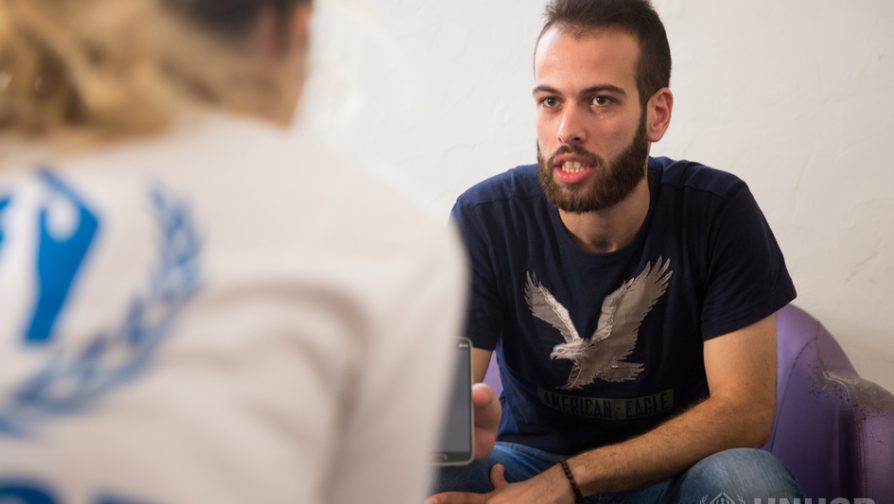
Iraqi refugee Zaid speaks with a UNHCR staff member about the trauma and torture he endured that led him to flee Iraq to Lebanon in 2014. (c) S. Hoibak / UNHCR
As a journalist in Iraq, Zaid (24) had big dreams and ambitions. But after brutal kidnappings and torture he survived in 2011 and 2013, his dreams were dashed. “After my first kidnapping, I woke up in a dumpster and I understood that dreams don’t come true easily”. Zaid was so traumatized that he could not leave his house for nearly two years.
Iraq is one of the world’s dangerous countries for journalists, according to the NGO Reporters Without Borders. A deteriorating security situation and political tensions severely limit journalists in carrying out their job. In addition to facing assault and harassment, they are also subject to retaliatory attacks for their reporting.
When Zaid started venturing out and working again, he was kidnapped one more time. After his release, his injuries were too severe and his pain unbearable. That’s when he decided not to take any more chances and fled to Lebanon in search of safety.
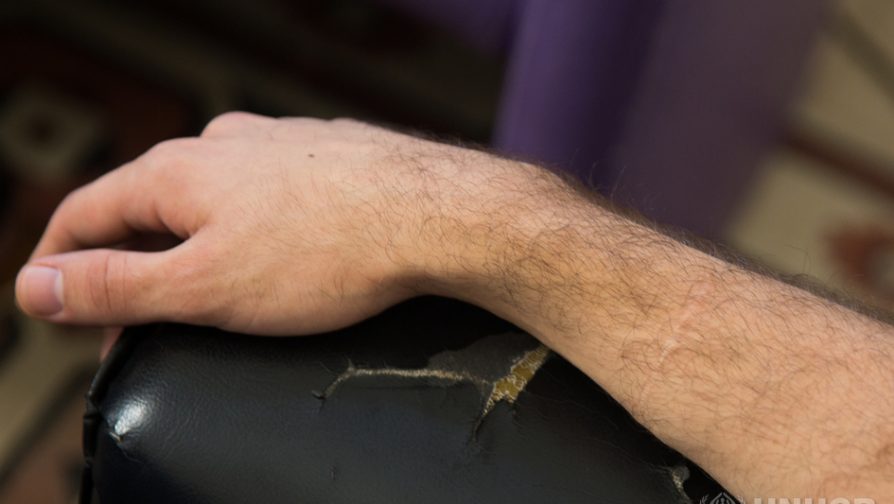
Zaid’s right forearm shows a clear scar. This wound is a reminder of the torture he endured during his kidnappings. (c) S. Hoibak /UNHCR
Zaid’s kidnappings left scars on his mind and body. When he arrived at the UNHCR office in Beirut, he was teary and emotional. “I could not look anyone in the eyes”, said Zaid. “UNHCR staff could see this and referred me to Restart to get mental health support”. He was also in severe pain from an injury on his right arm.
The Restart social worker who received Zaid remembers when he first arrived to the center. “He was very confused and emotional at first.” For one year, Zaid underwent psychotherapy. He had been feeling alone and isolated between the four walls of his room. The nightmare he endured in Iraq made him very withdrawn and unable to talk to anyone.
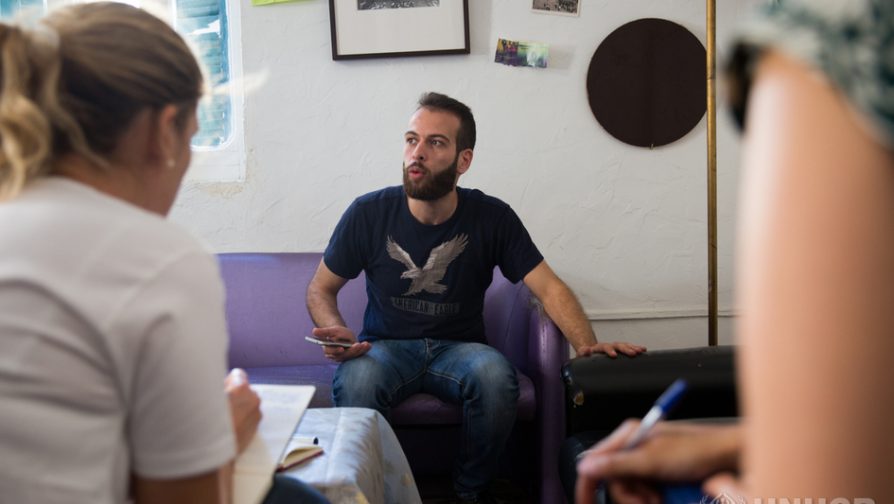
Zaid speaks with UNHCR staff and his Restart social worker in the comfort of his home. Zaid lives in a room that Syrian friends helped him find. (c) S. Hoibak / UNHCR
His therapist, Hala, was the first person to whom he could really open up. Now he can talk freely about his situation, from what he endured in Iraq to the day-to-day challenges of living in Lebanon as a refugee. After receiving medical attention at the centre for his injured hand, Zaid was able to practice photography again and even became a self-taught graphic designer.
“I learned a lesson this year – that instead of waiting and dreaming, I need to live in the present.” His therapy has helped him to set goals and chart out how he plans to achieve them. “Now, I want to learn English and produce a movie to share my story.”

Zaid thanks his therapist Hala for all of her support during the therapy. (c) S. Hoibak / UNHCR
Two months after completing his therapy, Zaid returns to the centre to meet his therapist, Hala. Extending his hand, he says, “Thank you Hala. You are my family”.
Psychotherapists work with refugee patients to lessen the impact of traumatic experiences they have endured and support them in adapting to their new situation. Zaid is one of the many refugees in Lebanon who have benefitted from mental health services provided through UNHCR.
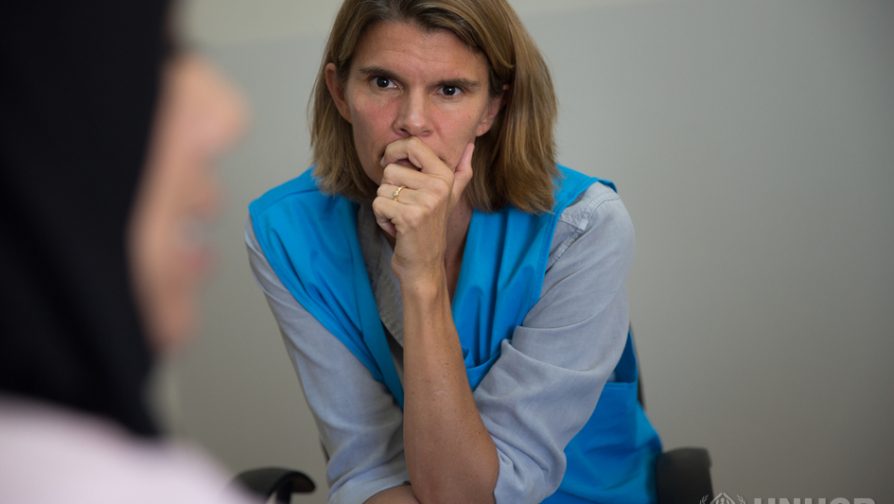
Syrian refugee Nour recalls the story of her escape from her war-torn town while Emily, a Protection Officer with UNHCR listens attentively. (c) S. Hoibak/ UNHCR
Nour, a single mother of two, fled from Syria in 2012 along with her parents and young children. She tells Emily, a Protection Officer with UNHCR, how the war had made her feel so helpless.
As a Protection Officer Emily works with refugees with specific needs, including women and children, to make sure their rights are protected. “I feel very privileged to do the work that I do. Having grown up in the United States and now working in Lebanon, I am reminded every day of how we all share the same hopes and desires, and of how powerful and brave we can be. I am honored that those I work with tell their stories to me and trust me to help.”
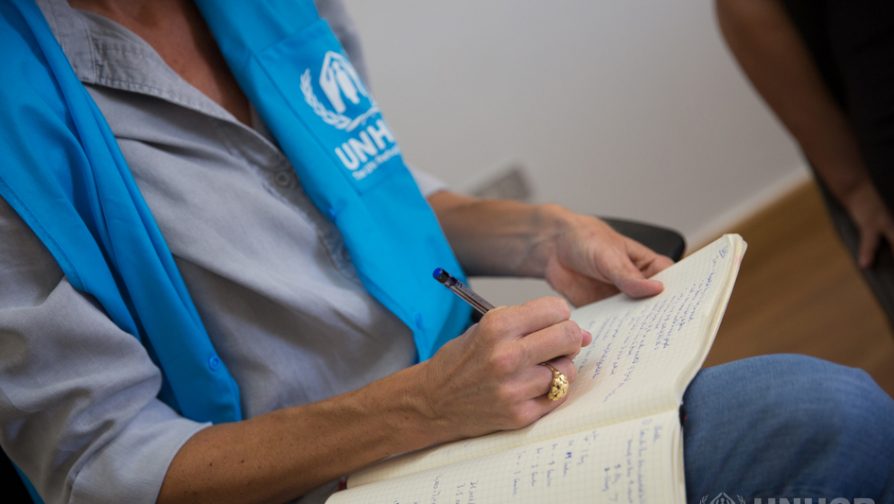
Documentation of refugee stories is important so that UNHCR can refer those in need to appropriate support services and conduct necessary follow-up. (c) S. Hoibak / UNHCR
During one of her regular visits to the medical centre, Emily takes notes as Nour shares her story. As a trained nurse, Nour tried to assist the many wounded in her town during the war, but there was little she could do. All the doctors in her area had fled. Nour and the remaining nurses had barely any equipment at their disposal. “There were no supplies – even basic pain killers and medications were not available. There were too many losses. Too much blood”, she says. “It was so painful not to be able to help, when you have the skills but no means to do so”.
Nour describes how the sounds of bombings echoed relentlessly during her last month in Syria and how whole families were dying in front of her eyes. After losing yet another member of her own family, Nour decided to leave for good. “This was really the turning point. I was psychologically devastated and I could only think of my children’s safety”, said Nour.
A few years ago, Nour started volunteering with UNHCR, going from family to family to inform them about available services, and help those in need to find assistance. Her skills as a nurse make her a great asset to UNHCR’s volunteering programme, given the many health concerns that refugees face. Nour’s participation in the programme also gave her back a sense of purpose.
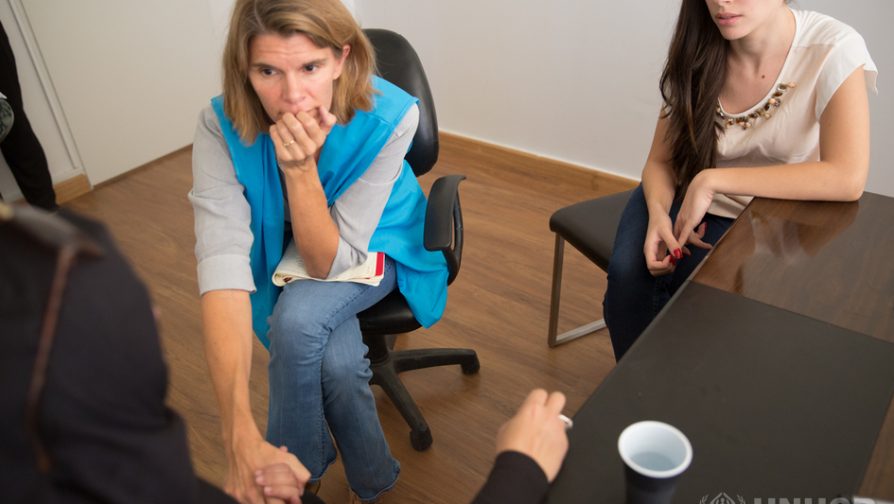
After her mother passed away, Nour had a breakdown and attempted suicide. Holding her hand, Emily listens to her story. (c) S. Hoibak / UNHCR
At one point, hearing about other refugees’ suffering took a toll on Nour. She was affected by all the suffering she was hearing, as well as by her own pain. To make matters worse, tragedy struck again in 2015 when Nour’s mother’s health suddenly deteriorated. “I could not get her appropriate care quickly enough. I could not save her from dying.”
It was all just too much and Nour felt her world was crumbling underneath her. She could not even be around her own children. Nour was driven to such despair that she tried to take her life by jumping into the sea from great heights. Her life was saved by a passerby, who pulled her back from the edge and brought her to the UNHCR office in Beirut.
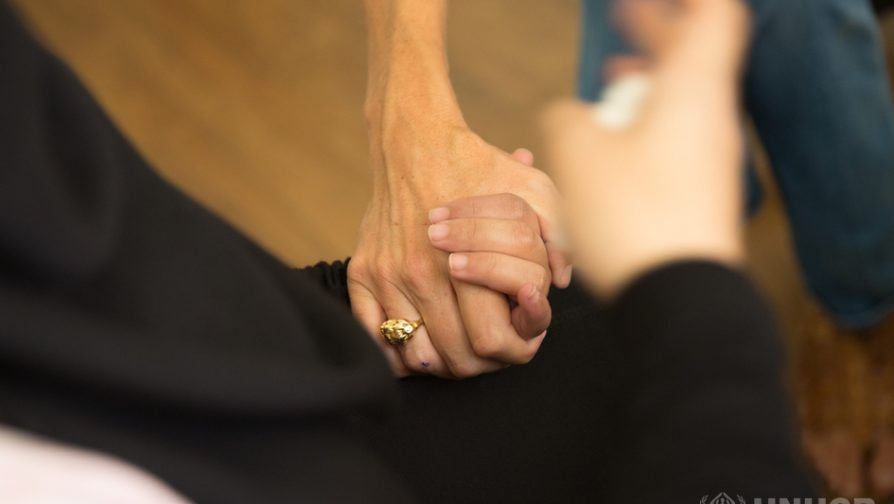
It was all just too much and Nour felt her world was crumbling underneath her. (c) S. Hoibak / UNHCR
UNHCR referred Nour to a psychiatrist, and she is now undergoing therapy, which allows her to sleep again, feel positive, and stop her panic attacks. “When someone is down, all you need is a hand to help you stand up again. My therapist Hala walked with me step by step”, Nour said as she smiled at Hala listening to her every word.
“I went from not even being able to tolerate my children, to being able to really embrace them again.”
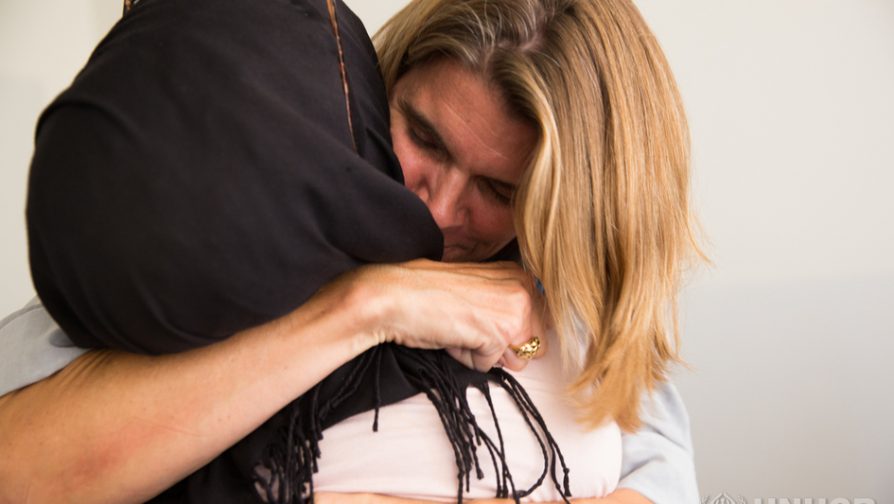
”I went from not even being able to tolerate my children, to being able to really embrace them again,” says Nour hugging Emily. (c) S. Hoibak / UNHCR
UNHCR’s note: This story has also been published at:
http://www.huffingtonpost.com/caroline-gluck/mental-health-support-a-s_b_12425074.html.
شارك على الفيسبوك شارك على تويتر